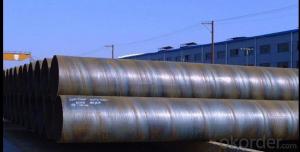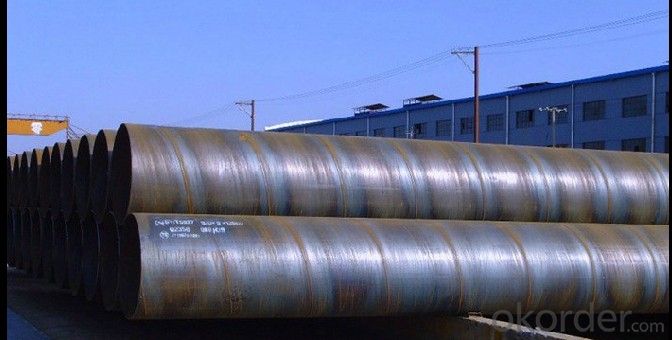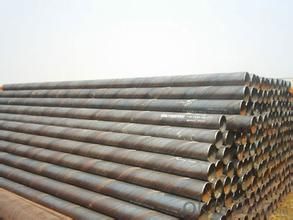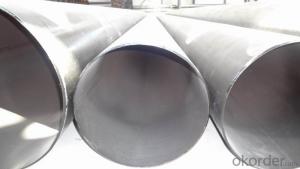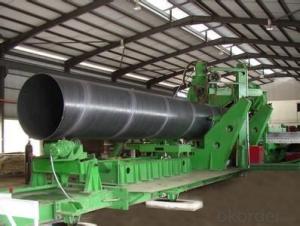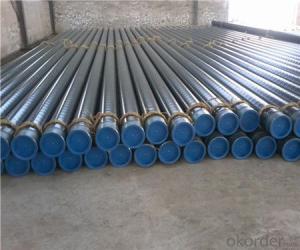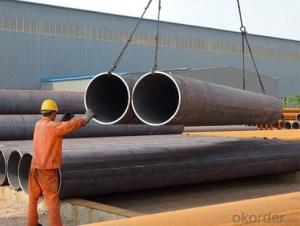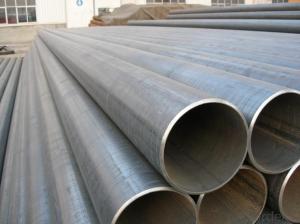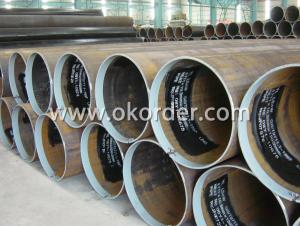API 5L Gr.B SSAW Spiral Pipe
- Loading Port:
- China Main Port
- Payment Terms:
- TT or LC
- Min Order Qty:
- 25-35 m.t.
- Supply Capability:
- -
OKorder Service Pledge
OKorder Financial Service
You Might Also Like
Quick Details
Thickness: | 6 - 28 mm | Section Shape: | Round | Outer Diameter: | 219 - 3500 mm |
Place of Origin: | Tianjin (Mainland) | Secondary Or Not: | Non-secondary | Application: | Oil Pipe |
Technique: | SAW | Certification: | API | Surface Treatment: | as per your request,Black/Blue 3PE or as per your request |
Special Pipe: | API Pipe | Alloy Or Not: | Non-alloy | ||
Certificate: | ISO 9001:2008, API, SGS, BV | Material: | Q235A/B,Q345,L360 and X42-X80 grade | Package: | In bulk or bundles |
Usage: | structure pipe | Main market: | all over the world | Product name: | SSAW Spiral Steel Tube |
End: | Beveled End |
FAQ of SSAW Spiral Pipe:
①How is the quality of your products?
Our products are manufactured strictly according to national and internaional standard, and we take a test on every pipe before delivered out. If you want see our quality certifications and all kinds of testing report, please just ask us for it.
Guaranteed: If products’ quality don’t accord to discription as we give or the promise before you place order, we promise 100% refund.
②How about price?
Yes, we are factory and be able to give you lowest price below market one, and we have a policy that “ for saving time and absolutely honest business attitude, we quote as lowest as possible for any customer, and discount can be given according to quantity”,if you like bargain and factory price is not low enough as you think, just don’t waste your time.Please trust the quotation we would give you, it is professional one.
③Why should you chose us?
Chose happens because of quality, then price, We can give you both.Additionally, we can also offer professional products inquiry, products knowledge train(for agents), smooth goods delivery, exellent customer solution proposals.
SSAW Spiral Pipe Images:
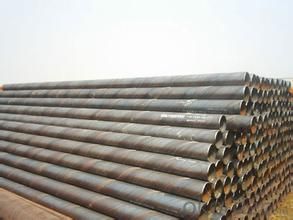
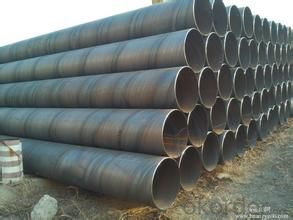
- Q: Can steel pipes be used for underground cable conduits?
- Yes, steel pipes can be used for underground cable conduits. Steel pipes have high strength and durability, making them suitable for protecting and housing cables underground. They provide excellent protection against external elements and can withstand a wide range of environmental conditions. Additionally, steel pipes offer good resistance to corrosion, ensuring the longevity of the cable conduit system.
- Q: How are steel pipes graded?
- Steel pipes are graded based on various factors such as the composition of steel, manufacturing process, and physical properties like strength, durability, and corrosion resistance. These grades are assigned based on internationally recognized standards such as ASTM, API, and ISO, which provide specific criteria for different applications and industries.
- Q: Can steel pipes be used for conveying sewage and wastewater?
- Indeed, sewage and wastewater can be conveyed using steel pipes. The use of steel pipes is widespread in sewage and wastewater systems owing to their robustness and resilience. They possess corrosion resistance and can endure immense pressure and flow rates. Moreover, steel pipes have the capability to manage the rigorous chemicals and pollutants found in sewage and wastewater without impairing or compromising the fluid quality. Nonetheless, it is crucial to guarantee proper coating or lining of the steel pipes to avert any potential problems concerning corrosion or contamination. Regular maintenance and inspections are equally important to detect and rectify any potential concerns that may arise within the system.
- Q: Can steel pipes be used for underground electrical conduits?
- Yes, steel pipes can be used for underground electrical conduits. Steel pipes are durable, strong, and resistant to external forces, making them suitable for protecting electrical wiring in underground installations. Additionally, steel pipes offer excellent corrosion resistance, ensuring the longevity and safety of the electrical system.
- Q: How are steel pipes used in power plants?
- Steel pipes are extensively used in power plants for various applications. One of the primary uses of steel pipes in power plants is for transporting fluids and gases. These pipes are used to carry water, steam, and fuel (such as oil or gas) throughout the power plant. The high strength and durability of steel make it an ideal material for these pipes, as they can withstand high pressure and temperature conditions. Steel pipes are also used in power plant boilers. They form an integral part of the boiler system, where they carry hot gases and steam. These pipes are designed to withstand extreme heat and pressure, ensuring the safe and efficient operation of the boiler. Additionally, steel pipes are used in the cooling systems of power plants. Water is circulated through these pipes to cool down the equipment, such as turbines and condensers. The pipes are designed to withstand corrosion from the cooling water and maintain the required flow rate and pressure. Furthermore, steel pipes are used in the construction of power plant structures. They are used for the fabrication of support structures, such as frames, platforms, and walkways. Steel pipes provide excellent structural integrity and can withstand heavy loads, making them suitable for such applications. In summary, steel pipes play a vital role in power plants by transporting fluids and gases, serving as a part of the boiler system, facilitating cooling processes, and providing structural support. Their strength, durability, and resistance to extreme conditions make them an essential component in the operation of power plants.
- Q: Can steel pipes be used for underground fuel storage systems?
- Steel pipes are an excellent choice for underground fuel storage systems. Due to their strength, durability, and resistance to corrosion, they are widely used in this application. By opting for steel pipes, one can rely on a secure and long-lasting solution for underground fuel storage. These pipes are capable of withstanding the pressure and weight of the fuel, making them suitable for this purpose. Moreover, their easy weldability and interconnectivity provide flexibility in designing and constructing such systems. However, it is crucial to ensure that the steel pipes used in underground fuel storage systems are properly coated or lined to prevent corrosion and protect the fuel from contamination. Regular inspections and maintenance play a vital role in identifying and addressing any potential issues that may arise.
- Q: Can steel pipes be used for solar energy systems?
- Yes, steel pipes can be used for solar energy systems. Steel pipes are often used for the construction of solar water heating systems, solar thermal collectors, and solar panel mounting structures. They are durable, cost-effective, and provide the necessary support for various components of a solar energy system.
- Q: How are steel pipes used in the food and beverage industry?
- Steel pipes are commonly used in the food and beverage industry for various applications including transporting water, steam, gases, and other liquids. They are preferred due to their durability, strength, and resistance to corrosion, ensuring the safety and hygiene of food and beverage products. These pipes are used in processes such as conveying ingredients, transferring liquids and gases during production, and supplying utilities like water and steam for cleaning and sterilization purposes.
- Q: How are steel pipes used in the manufacturing of geothermal systems?
- Steel pipes are used in the manufacturing of geothermal systems primarily for their durability and heat resistance. These pipes are used to transport geothermal fluids, such as water or steam, from the underground reservoir to the surface, where they can be utilized for heating or electricity generation. The high strength and corrosion resistance of steel pipes make them ideal for withstanding the harsh conditions and high temperatures encountered in geothermal applications. Additionally, steel pipes can be easily welded and connected, allowing for efficient installation and maintenance of geothermal systems.
- Q: How are steel pipes used in HVAC systems?
- Steel pipes are used in HVAC systems for various purposes such as transporting hot or cold water, steam, or refrigerant throughout the system. They are commonly used for supply and return lines, as well as for connecting various HVAC components like chillers, boilers, air handlers, and heat exchangers. Steel pipes are preferred in HVAC systems due to their durability, strength, and resistance to corrosion and high pressure.
Send your message to us
API 5L Gr.B SSAW Spiral Pipe
- Loading Port:
- China Main Port
- Payment Terms:
- TT or LC
- Min Order Qty:
- 25-35 m.t.
- Supply Capability:
- -
OKorder Service Pledge
OKorder Financial Service
Similar products
Hot products
Hot Searches
Related keywords
